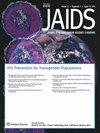Peer-Delivered HIV Self-Testing, Sexually Transmitted Infection Self-Sampling, and Pre-exposure Prophylaxis for Transgender Women in Uganda: A Randomized Trial.
IF 2.9
3区 医学
Q3 IMMUNOLOGY
JAIDS Journal of Acquired Immune Deficiency Syndromes
Pub Date : 2024-10-01
DOI:10.1097/qai.0000000000003471
引用次数: 0
Abstract
BACKGROUND Peer-delivered HIV self-testing (HIVST) and sexually transmitted infection self-sampling (STISS) may promote adherence to oral pre-exposure prophylaxis (PrEP), but no studies have analyzed this approach among transgender women (TGW) in sub-Saharan Africa. SETTING The Peer study was a cluster randomized trial in Uganda (October 2020-July 2022; NCT04328025). METHODS Ten TGW peer groups, each with 1 TGW peer and 8 TGW, were randomized 1:1 to receive quarterly in-clinic HIV testing with PrEP refills as standard-of-care (SOC) or SOC plus monthly peer delivery of oral-fluid HIVST, STISS, and PrEP refills (intervention). Participants were followed for 12 months. The primary outcome was PrEP adherence. RESULTS We screened 85 TGW and enrolled 82 (41 per arm). The median age was 22 years (interquartile range [IQR] 20-24). Twelve-month retention was 88% (72/82). At the 3, 6, 9, and 12-month clinic visits, 10%, 5%, 5%, and 0% of TGW in the intervention arm had TFV-DP levels ≥700 fmol/punch, versus 7%, 15%, 7%, and 2% in the SOC arm, respectively (P = 0.18). At all visits, any detectable TFV-DP levels were significantly higher in SOC than the peer delivery group (P < 0.04). PrEP adherence was associated with sex work (incidence rate ratio 6.93; 95% CI: 2.33 to 20.60) and >10 years of schooling (incidence rate ratio 2.35; 95% CI: 1.14 to 4.84). There was a strong correlation between tenofovir detection in dried blood spots and urine (P < 0.001). No HIV seroconversions occurred. CONCLUSIONS Peer-delivered HIVST and STISS did not increase low levels of oral PrEP adherence among TGW in Uganda. Long-acting PrEP formulations should be considered for this population.乌干达变性妇女的同伴提供 HIV 自我检测、性传播感染自我采样和接触前预防:随机试验
背景由同伴提供的 HIV 自我检测(HIVST)和性传播感染自我采样(STISS)可促进对口服暴露前预防药物(PrEP)的依从性,但目前还没有研究对撒哈拉以南非洲变性女性(TGW)中的这种方法进行分析。方法将十个变性女性同伴小组(每个小组有 1 名变性女性同伴和 8 名变性女性)按 1:1 的比例随机分组,接受每季度一次的诊所内 HIV 检测和 PrEP 补充药作为标准护理(SOC),或接受 SOC 加每月一次同伴提供口服流体 HIVST、STISS 和 PrEP 补充药(干预)。对参与者进行了为期 12 个月的随访。我们筛选了 85 名 TGW,并招募了 82 人(每组 41 人)。中位年龄为 22 岁(四分位数间距 [IQR] 20-24)。12 个月的保留率为 88%(72/82)。在3、6、9和12个月的门诊检查中,干预组分别有10%、5%、5%和0%的TGW的TFV-DP水平≥700 fmol/punch,而SOC组分别为7%、15%、7%和2%(P = 0.18)。在所有检查中,SOC 组检测到的任何 TFV-DP 水平都明显高于同伴给药组(P < 0.04)。坚持 PrEP 与性工作(发生率比为 6.93;95% CI:2.33 至 20.60)和受教育年限大于 10 年(发生率比为 2.35;95% CI:1.14 至 4.84)有关。在干血斑和尿液中检测到的替诺福韦有很强的相关性(P < 0.001)。结论在乌干达,同伴传播 HIVST 和 STISS 并未提高 TGW 对口服 PrEP 的依从性。对于这一人群,应考虑使用长效 PrEP 制剂。
本文章由计算机程序翻译,如有差异,请以英文原文为准。
求助全文
约1分钟内获得全文
求助全文
来源期刊
CiteScore
5.80
自引率
5.60%
发文量
490
审稿时长
3-6 weeks
期刊介绍:
JAIDS: Journal of Acquired Immune Deficiency Syndromes seeks to end the HIV epidemic by presenting important new science across all disciplines that advance our understanding of the biology, treatment and prevention of HIV infection worldwide.
JAIDS: Journal of Acquired Immune Deficiency Syndromes is the trusted, interdisciplinary resource for HIV- and AIDS-related information with a strong focus on basic and translational science, clinical science, and epidemiology and prevention. Co-edited by the foremost leaders in clinical virology, molecular biology, and epidemiology, JAIDS publishes vital information on the advances in diagnosis and treatment of HIV infections, as well as the latest research in the development of therapeutics and vaccine approaches. This ground-breaking journal brings together rigorously peer-reviewed articles, reviews of current research, results of clinical trials, and epidemiologic reports from around the world.

 求助内容:
求助内容: 应助结果提醒方式:
应助结果提醒方式:


